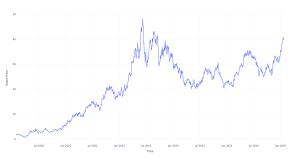The past couple of years have been terrific for stocks, with the benchmark S&P 500 index up a whopping 57.1% since the end of 2022. However, after the index’s two-year bull run, it’s getting harder to find quality dividend stocks that offer satisfying yields.
The average stock in the S&P 500 index offers a yield of just 1.2%, but Pfizer (NYSE: PFE), W.P. Carey (NYSE: WPC), and Omega Healthcare Investors (NYSE: OHI) offer more than 6% at recent prices. These businesses support steadily rising dividend payouts with time-tested strategies. Here’s why adding them to a diversified portfolio now makes a lot of sense for most income-seeking investors.
Start Your Mornings Smarter! Wake up with Breakfast news in your inbox every market day. Sign Up For Free »
Pfizer is one of the world’s largest pharmaceutical companies. Profit margins on its patent-protected medicines are wide enough that the company has been able to raise its dividend payout for 15 consecutive years.
Last December, Pfizer raised its dividend payout to 0.42 per share, which works out to a yield of 6.4% at recent prices. Investors who buy now can look forward to a 16th consecutive annual-payout bump soon.
This year, management expects adjusted earnings to reach $2.85 at the midpoint of management’s guidance range. That’s more than enough to support raising a payout currently set at just $1.68 annually.
Pfizer’s rheumatoid arthritis drug Xeljanz and its cancer therapy Ibrance are both losing ground to incoming competitors. The company reported third-quarter sales that rose 31% year over year, despite a loss of market share for the two top-selling products.
Adding new medicines to replace older ones that lose exclusivity or face new competition is something Pfizer does well. For example, the Food and Drug Administration approved nine new drugs from Pfizer in 2023 that will push its big needle forward in the decade ahead.
W.P. Cary is a real estate investment trust, or REIT, that’s fallen on hard times. Instead of managing properties, it takes a hands-off approach with net leases that transfer the variable costs of building ownership to its tenants.
Net-lease REITs tend to produce reliable cash flow, but W.P. Carey’s bottom line has been slipping. The company spun off its office property portfolio last year, plus one of its larger tenants, True Value, declared bankruptcy in October.
Shares of W.P. Carey declined recently in response to a third-quarter earnings contraction. At recent prices, the stock offers a 6.1% yield.


